On December 31, 1986, the Western Gear Corporation closes after six decades in Washington and 25 years on the Everett waterfront. The following day, January 1, 1987, its property will be transferred to the U.S. Navy, which will build Naval Station Everett on the Western Gear site. The closure marks the end of an enterprise that was founded in 1888, and eliminates approximately 350 local jobs.
Navy Sets Sail for Puget Sound
On October 13, 1982, the Navy announced plans to locate an aircraft carrier task force in Washington. According to congressional sources, either Seattle or Everett would be the location for the new base. Throughout 1983, cost and impact studies were conducted to determine the best choice. At one point, splitting the ships between Everett’s waterfront and Seattle’s Pier 91 was considered a possibility.
On April 17, 1984, the Navy announced its selection of Everett as the site for a new homeport, but uncertainty remained about funding approval. The following day, at an Everett City Council meeting, citizens who opposed locating a Navy base in Everett requested a vote to determine the opinion of Everett voters. In an advisory vote on the November 1984 ballot, voters approved the Navy base by a 2-to-1 margin.
The property acquisition occurred in two stages. On July 25, 1986, the Navy announced the purchase of 22 acres from Western Gear Corporation for $17.5 million. On October 2, 1986, Congress approved the first funds for the new Navy Base. On May 5, 1987, the Port of Everett Commissioners approved the sale of 143 acres of property for $43.5 million.
Western Gear Must Vacate
The sale of the Western Gear property announced on July 25, 1986, required vacating the property by December 31. During the ensuing five months, the company had to remove all people, equipment, and records from the property.
At the time of the sale, Western Gear's parent company, Bucyrus Erie of Milwaukee, Wisconsin, had not announced whether it would move the company or permanently close it. There were several options offered for relocation, including property near Paine Field in Everett and property near the Skagit Regional Airport in Burlington. Other options included moving work and personnel to other existing Western Gear divisions in other states. By the time the facility closed, Bucyrus Erie had decided that rather than relocate the Everett operations, it would close the division permanently and sell product designs and rights to other parties.
The company terminated employees in three groups over a three-month period in October, November, and December 1986. It provided up to three months of full-salary severance pay and medical insurance coverage after termination for employees based on their years of service. At the end of that period, if an active job search did not result in new employment, the company extended severance pay at half salary for up to three more months.
To accommodate the administration of these benefits and assistance with job searches, Western Gear rented office space for human-resources personnel on Colby Avenue in downtown Everett. The space included personal computers for use by former employees to prepare job-search documents.
For Sale to the Highest Bidder
The company had to liquidate all the equipment, furnishings, and supplies used to manufacture Western Gear products. Everything from milling machines, heat treat furnaces, grinders, tubing benders, and welding equipment, all the way down to office equipment and cafeteria furniture was sold. A three-day auction in November 1986 brought a carnival-like atmosphere to an area that had hummed with the sounds of productivity for so many years. Organizers even brought in a county fair Onion Burger concession cart, setting it up on the factory floor to feed the hungry bidders. The scent of grilling burgers and the sounds of the auctioneer drifted through the building. During the sale, the auctioneers moved from item to item on the shop floor of the various buildings and eventually reached the business and engineering offices. (As the author can attest, it is a very strange feeling when an auctioneer works his way down your aisle to the big old steel desk that had been your workspace for many years and sells it for the opening bid of $15. Of course, the new owner now faced the daunting task of wrestling that heavy steel desk down the steep narrow stairway to remove it from the premises.)
Over six decades in Washington, Western Gear had designed and built a large variety of machinery for many industries creating high-valued intellectual property. Rather than continuing to build and sell these products, Bucyrus Erie sold the main product lines of Western Gear Machinery Company to Westech Gear in Lynwood, California, which was formed in 1985 from a former Western Gear division. Westech offered many Western Gear employees from Everett positions there if they wished to move to Southern California.
The End of Western Gear
With the closure of the Everett division, only three of Western Gear's divisions remained (there were seven when Bucyrus Erie purchased Western Gear in 1982). Bucyrus Erie already had sold off or closed the other divisions. The three remaining were Flight Structures in Jamestown, North Dakota, which designed and built onboard cargo-handling equipment for commercial aircraft; Applied Technology in City of Industry, California; and Electrosystems in Brea, California. The California divisions built helicopter transmissions and aircraft flight-control actuators. In early 1987, Bucyrus Erie sold these remnants of Western Gear to the British aerospace firm Lucas Industries.
On the bright side, the timing of the closure in Everett coincided with an up cycle of employment at Boeing in Everett. The Boeing 747-400 program was behind schedule and looking for experienced people in all areas for engineering, office, and factory work. Many former Western Gear employees went right to work without missing a paycheck. The high employment level at Boeing also provided opportunities for careers for former employees in other businesses. Some chose to start their own business. For others, the closure provided an opportunity to retire.

